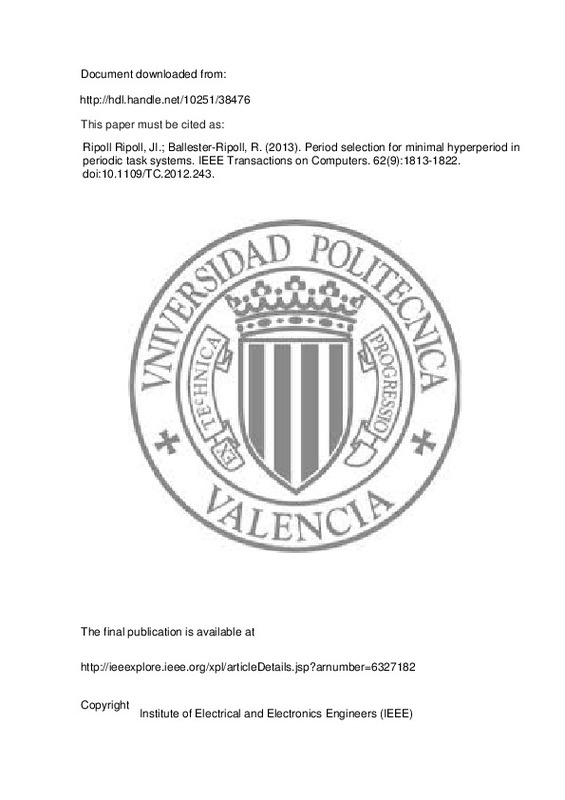JavaScript is disabled for your browser. Some features of this site may not work without it.
Buscar en RiuNet
Listar
Mi cuenta
Estadísticas
Ayuda RiuNet
Admin. UPV
Period selection for minimal hyperperiod in periodic task systems
Mostrar el registro sencillo del ítem
Ficheros en el ítem
| dc.contributor.author | Ripoll Ripoll, José Ismael
|
es_ES |
| dc.contributor.author | Ballester-Ripoll, Rafael
|
es_ES |
| dc.date.accessioned | 2014-06-30T11:54:44Z | |
| dc.date.issued | 2013-09 | |
| dc.identifier.issn | 0018-9340 | |
| dc.identifier.uri | http://hdl.handle.net/10251/38476 | |
| dc.description | © 2013 IEEE. Personal use of this material is permitted. Permission from IEEE must be obtained for all other uses, in any current or future media, including reprinting/republishing this material for advertising or promotional purposes, creating new collective works, for resale or redistribution to servers or lists, or reuse of any copyrighted component of this work in other works. | es_ES |
| dc.description.abstract | Task period selection is often used to adjust the workload to the available computational resources. In this paper, we propose a model where each selected period is not restricted to be a natural number, but can be any rational number within a range. Under this generalization, we contribute a period selection algorithm that yields a much smaller hyperperiod than that of previous works: with respect to the largest period, the hyperperiod with integer constraints is exponentially bounded; with rational periods the worst case is only quadratic. By means of an integer approximation at each task activation, we show how our rational period approach can work under system clock granularity; it is thus compatible with scheduling analysis practice and implementation. Our finding has practical applications in several fields of real-time scheduling: lowering complexity in table driven schedulers, reducing search space in model checking analysis, generating synthetic workload for statistical analysis of real-time scheduling algorithms, etc. | es_ES |
| dc.description.sponsorship | This work has been funded by the Spanish Government Research Office, project TIN2008-06766-C03-02 (RT-MODEL). | en_EN |
| dc.format.extent | 10 | es_ES |
| dc.language | Inglés | es_ES |
| dc.publisher | Institute of Electrical and Electronics Engineers (IEEE) | es_ES |
| dc.relation.ispartof | IEEE Transactions on Computers | es_ES |
| dc.rights | Reserva de todos los derechos | es_ES |
| dc.subject | Algorithm design and analysis | es_ES |
| dc.subject | Analytical models | es_ES |
| dc.subject | Control systems | es_ES |
| dc.subject | Real-time systems | es_ES |
| dc.subject | Scheduling | es_ES |
| dc.subject | Scheduling algorithms | es_ES |
| dc.subject | Real-time | es_ES |
| dc.subject | Hyperperiod | es_ES |
| dc.subject | Periodic tasks | es_ES |
| dc.subject | Plan generation | es_ES |
| dc.subject.classification | ARQUITECTURA Y TECNOLOGIA DE COMPUTADORES | es_ES |
| dc.title | Period selection for minimal hyperperiod in periodic task systems | es_ES |
| dc.type | Artículo | es_ES |
| dc.embargo.lift | 10000-01-01 | |
| dc.embargo.terms | forever | es_ES |
| dc.identifier.doi | 10.1109/TC.2012.243 | |
| dc.relation.projectID | info:eu-repo/grantAgreement/MICINN//TIN2008-06766-C03-02/ES/PLATAFORMAS DE TIEMPO REAL PARA DISEÑO DE SISTEMAS EMPOTRADOS BASADO EN MODELOS/ | es_ES |
| dc.rights.accessRights | Abierto | es_ES |
| dc.contributor.affiliation | Universitat Politècnica de València. Departamento de Informática de Sistemas y Computadores - Departament d'Informàtica de Sistemes i Computadors | es_ES |
| dc.description.bibliographicCitation | Ripoll Ripoll, JI.; Ballester-Ripoll, R. (2013). Period selection for minimal hyperperiod in periodic task systems. IEEE Transactions on Computers. 62(9):1813-1822. https://doi.org/10.1109/TC.2012.243 | es_ES |
| dc.description.accrualMethod | S | es_ES |
| dc.relation.publisherversion | http://ieeexplore.ieee.org/xpl/articleDetails.jsp?arnumber=6327182 | es_ES |
| dc.description.upvformatpinicio | 1813 | es_ES |
| dc.description.upvformatpfin | 1822 | es_ES |
| dc.type.version | info:eu-repo/semantics/publishedVersion | es_ES |
| dc.description.volume | 62 | es_ES |
| dc.description.issue | 9 | es_ES |
| dc.relation.senia | 246503 | |
| dc.contributor.funder | Ministerio de Ciencia e Innovación | es_ES |







![[Cerrado]](/themes/UPV/images/candado.png)

